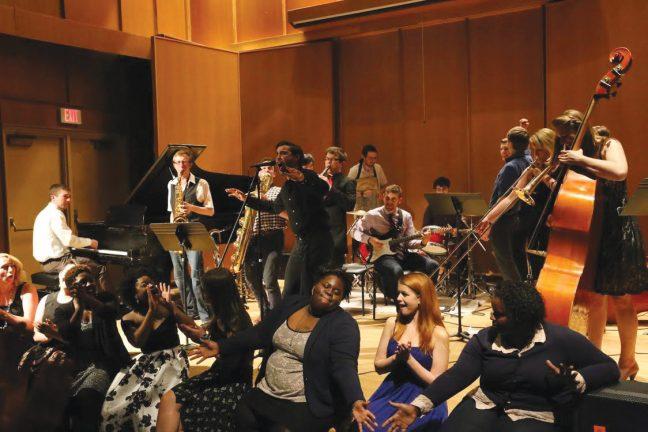The Verona Quartet, a tribute to author William Shakespeare, formed eight years ago when violinists Jonathan Ong and Dorothy Ro, violist Abigail Rojansky and cellist Jonathan Dormand were students at the Jacobs School of Music at Indiana University in Bloomington, Indiana.
They studied under various mentors at The Juilliard School, then New England Conservatory, where they gained management. The Verona Quartet are currently the quartet in residence at Oberlin College.
There is a fine-tuned system of unspoken communications for when different parts start playing. Rojansky, who has a background in conducting and musicology at Oberlin, says that the musicians in a string quartet act as joint conductors, as everyone has to understand the whole score and their role as a “cog in this greater machine that is the string quartet.”
The concert opened with a live question and answer session led by James Waldo, a graduate student at the University of Wisconsin’s Mead-Witter School of Music. This was followed by a prerecorded program.
The first piece the quartet performed was “String Quartet in A minor, Op. 51 No. 2” by Johannes Brahms, featuring guest cellist Annie Jacobs-Perkins.
The second piece was “String Quartet No. 12 in F Major, Op. 96” by Antonín Dvořák, featuring guest cellist Dmitry Kouzov.
“Music is not in a vacuum,” Rojansky said. “Rather, it is a reflection of the composer’s life, feelings and of history.”
Each of the pieces chosen for the concert have a complex history behind them.
“String Quartet in A minor, Op. 51 No. 2″
There are only three string quartets written by Johannes Brahms. He was self-conscious about his quartets and was said to have destroyed over 30 string quartets he wrote before allowing his first string quartet to be published at age 40.
Brahms felt immense pressure to live up to his predecessors, such as Haydn or Beethoven, who wrote many symphonies. Some things that the Verona Quartet pointed out in this piece were the extra notes and textures in the viola part, apparently meant to create a lush and symphonic sound in a more intimate chamber music setting.
The opening of the quartet presents the audience with the tension and angst that Brahms might have felt while writing these pieces. The use of hemiola with triplets gives the piece an off-kilter, unstable vibe, like a crumbling Jenga tower.
The recording of the Brahms was taken in the Whitehall antique store in Chapel Hill, North Carolina. The Verona Quartet chose this venue as it was very intimate, almost like a performance in someone’s dining room.
“String Quartet No. 12 in F Major, Op. 96” or “American”
Dvorak’s “American” Quartet was written during his short stay in America. Dvorak was Czech, but was brought to New York to become the head of the new National Conservatory. His goal was to help young American composers to develop an “American” style of composing.
The National Conservatory was unique at the time for bringing in musicians that were not part of the classical canon — the student body comprised students of color and students of different socioeconomic backgrounds. The conservatory would be where Dvorak met Harry T. Burleigh, who would also go on to have a prolific career as a composer. Burleigh exposed Dvorak to African American spirituals, which would inspire Dvorak.
Dvorak would later live in a Czech community in Spillville, Iowa, where he would compose many works, such as this quartet and his famous “New World” Symphony. This quartet incorporates many of the sights and sounds of Spillville, as well as American Indian and African American music styles.
Throughout the piece, you can hear the ostinato, or repeat theme, of a train whistle. Particularly prominent in the third movement are bird calls, inspired by the manager. Dvorak’s “American” represents his impression of America through the lens of a Czech composer.
The COVID-19 pandemic has proved to be a major challenge for professional musicians everywhere. The Verona Quartet said their main difficulties were in meeting for performance, as cellist Jonathan Dormand is out of the country and unable to rehearse in-person due to travel restrictions.
While concerts in-person are not possible at the moment, the Verona Quartet is planning many future events to keep an eye on, including the following:
The Up Close Chamber Music Project will be curated by the Verona Quartet, with the mission to bring top-level chamber music to more people throughout North Carolina. The Quartet has plans of performing chamber music in intimate performance venues — meaning audiences of less than 300 people — to get the audience up close and personal to chamber music.
The Cleveland Quartet Award Tour will also take place once live performances are possible.
The Verona Quartet will also be releasing their debut album, “Diffusion,” featuring works by Ravel, Janacek and Szymanowski.


